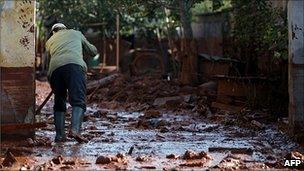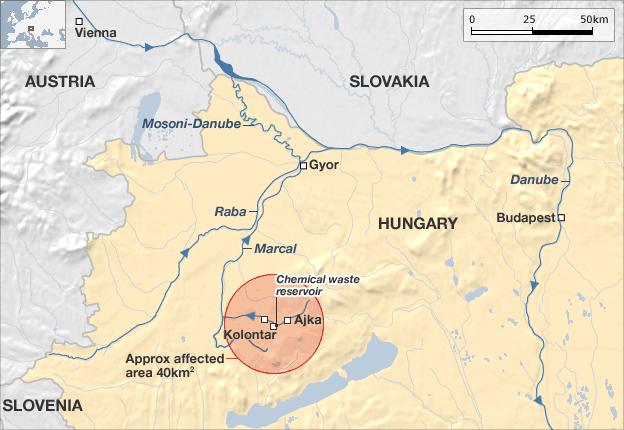Hungary fears new leak from toxic sludge reservoir
- Published

Nearby villages have been stained red by the spill
The Hungarian village of Kolontar has been evacuated after new damage was discovered at a burst reservoir that spilled toxic sludge on Monday.
Prime Minister Viktor Orban said it was "very likely" that an entire wall of the reservoir would collapse, releasing a fresh wave of chemical effluent.
Mr Orban also said there would be "very severe" consequences for those to blame for the disaster.
At least seven people have died as a result of the accident.
Around 150 people were injured by the spill of up to 700,000 cubic metres (24.7m cu ft) of red toxic sludge - many receiving burns.
Most of those killed were drowned or swept away in Kolontar as the sludge hit on Monday. The village is the closest to the reservoir, and would be expected to bear the brunt if there were a second spill.
On Saturday morning, about 800 residents were taken to a sports hall and two schools in Ajka, 8km (five miles) away.
Rescue team spokesperson Gyorgyi Tottos said the new damage to the northern wall of the reservoir was relatively minor, but villagers were evacuated as a precaution.
However the prime minister, in a press conference at the scene, painted a more serious picture.
Viktor Orban said it was very likely that the weakened wall of the reservoir would collapse
"It's in very bad shape and our estimation is that the wall could fall down," he said. "It's very likely that it will happen... One consequence is that human lives could be in danger."
"Behind this tragedy some human errors and mistakes must exist. We will reveal all of that and the consequences will be very severe, tough, as much you can imagine," he added.
Mr Orban said another 500,000 cubic metres of waste could escape if the reservoir wall were breached again.
This would be heavier and thicker than the first spill, and would move slower - but would be even more toxic, says the BBC's Duncan Kennedy at the scene.
Besides those evacuated from Kolontar, police were also telling residents of the neighbouring village of Devecser to pack a single suitcase so they could leave quickly if necessary.
In the last few days, residents and emergency workers have worked round-the-clock to remove the worst of the sludge which damaged houses, streets and farmland, and polluted waterways.

All life in the Marcal river, which feeds the Danube, is said to have been extinguished.
The sludge reached the Danube on Thursday, but Hungarian officials said on Friday that the pH level in the river was "normal", easing fears that Europe's second longest river would be significantly polluted.
Emergency crews have been working to dilute the alkaline content of the spill, adding huge quantities of gypsum and chemical fertilisers to the waters of the Marcal and Raba rivers.
The disaster's confirmed death toll rose to seven on Friday, after an 81-year-old man died from injuries sustained in the torrent and two bodies were found on the outskirts of the village of Devecser.
The victims were likely to be two of three Kolontar residents still missing, disaster unit chief Tibor Dobson said.
The company responsible for the alumina plant, MAL Hungarian Aluminium Production and Trade Company, has offered its condolences to the families of the bereaved but insists it did nothing wrong.
It said it was devoting "all its energies and efforts" to tackling the spill, and had released 110,000 euros (£96,000) so far to help with the clean-up.
- Published8 October 2010
- Published8 October 2010
- Published8 October 2010
- Published6 October 2010
- Published7 October 2010
- Published5 October 2010